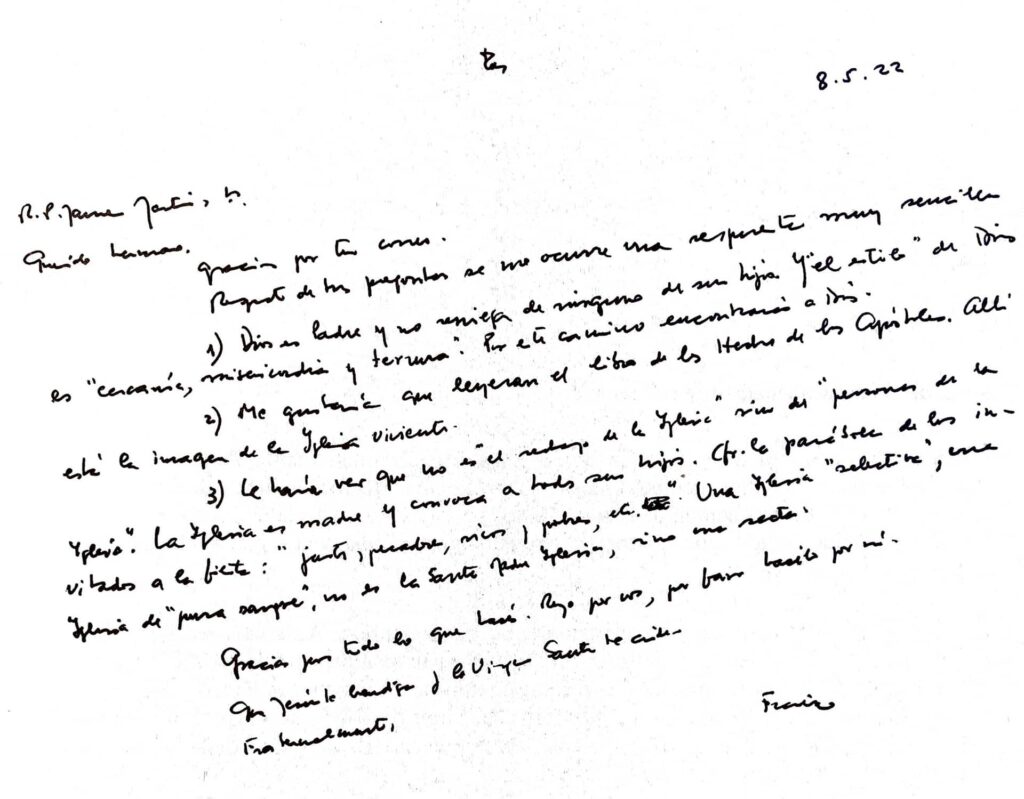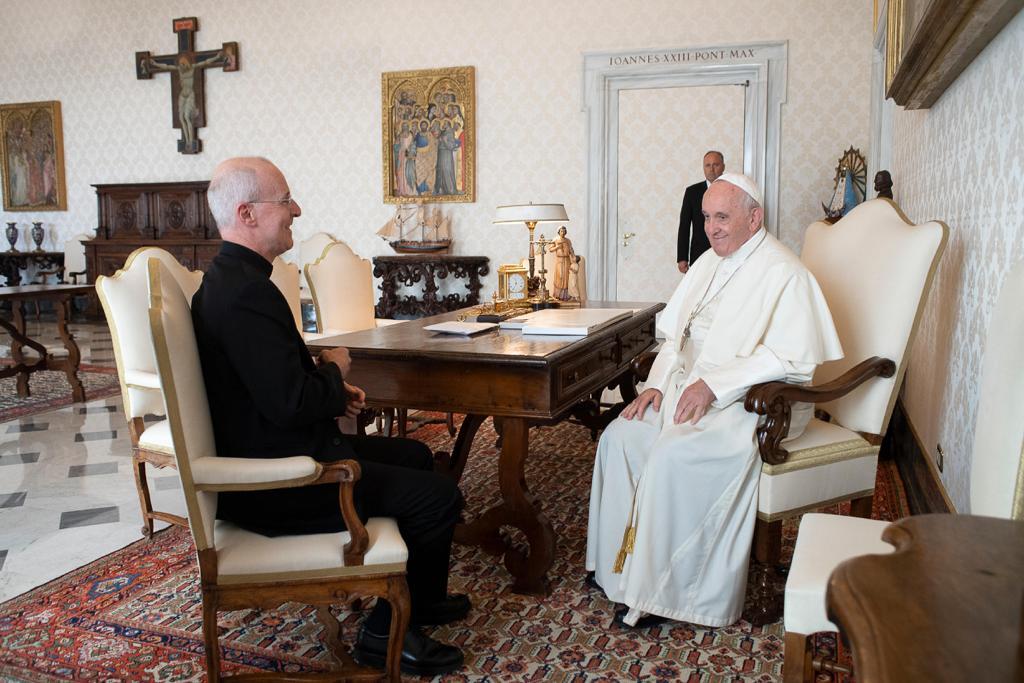It’s not often you can pinpoint moments when your life changes. The most profound moment for me was seeing a documentary about the Trappist monk Thomas Merton, which eventually led me to leave a life in the corporate world and enter the Jesuits in 1988. But another was a moment at the Vatican, in September, 2019.
I was in Rome for my first meeting with the Dicastery for Communication, as a consultor, a recent appointment by Pope Francis that had shocked me (and a few others). Previously, I had corresponded with the Holy Father through notes and emails, and I thought that would be the extent of our contact. After all—and this is not false humility—I am not a cardinal, bishop, provincial superior, university president or anything “official” in the church. I knew from notes—and, to my surprise, a phone call—from him that he had enjoyed some of my books, but there are plenty of Catholic authors who fit that bill.
A friend of the pope asked if I would like to meet him during my visit, and of course I said yes. He contacted Pope Francis, who said he would like to meet me. So, after the pope met with the staff of the dicastery, I lined up to shake his hand, along with 300 other people. When I introduced myself, he said words, in Spanish, that changed my life: “Ah! I’d like to have an audience with you!” My Spanish is poor, so I just blurted out, “Yo también!” A Vatican photographer snapped a photo of that moment.
Even though I had barely slept the night before, I wasn’t nervous at all. Pope Francis’ calm, kind, sunny demeanor instantly put me at ease.
A week later we were in his library at the Apostolic Palace, along with a translator. The appointment was listed on his official calendar and a Vatican photographer was on hand, which meant the pope wanted our meeting to be known, a gesture that deeply moved me, since at the time I was enduring a few public protests after publishing a book on LGBTQ Catholics.
Even though I had barely slept the night before, I wasn’t nervous at all. His calm, kind, sunny demeanor instantly put me at ease. A cardinal suggested that since the pope had invited me, I should start the conversation by asking what he wanted to talk about. When I did, he smiled, leaned back in his chair, spread his arms wide and said, “What do you want to talk about?”
You will probably not be surprised to learn that I wanted to talk about LGBTQ Catholics, a group to whom I minister; I also assumed that this was why the pope wanted to meet with me.
Francis revolutionized the church’s approach to LGBTQ people.
Pope Francis did more for LGBTQ people than all his predecessors combined. This is not a slight against, for example, St. John Paul II or Benedict XVI, who were both holy men. But perhaps because of his experience with LGBTQ people as Archbishop of Buenos Aires, perhaps because more people had been coming out over the last 10 years, or perhaps because he was, at heart, a pastor who wanted to reach out to “todos, todos, todos,” Francis revolutionized the church’s approach to LGBTQ people.
Now some may scoff or say, as often is the case, “Not enough!” And it’s true that some of the reforms that many LGBTQ people wanted—changing the catechism’s reference to homosexuality as a “disorder” and even approving same-sex marriage—did not happen during Francis’s pontificate. But it’s important to consider what he did, which could scarcely have been imagined before he took office.
To begin with, Francis was the first pope ever to use the word gay publicly. His five most famous words, “Who am I to judge?,” referred to a question posed to him about gay priests. He publicly opposed the criminalization of homosexuality, and when asked by Outreach what he would tell bishops who continued to support such a stance, he said simply that they were “wrong.” He appointed an openly gay man, his friend Juan Carlos Cruz, to a pontifical commission. He told parents that they should welcome their gay children. He met regularly with those who minister to LGBTQ people, including me and Sister Jeannine Gramick and her colleagues at New Ways Ministry. He wrote letters of welcome to Outreach conferences for LGBTQ Catholics. He approved the publication of “Fiducia Supplicans,” a Vatican document that permitted priests to bless same-sex marriages under certain circumstances—and weathered intense blowback from some parts of the church. And, perhaps most surprisingly and least well known, he met regularly with transgender Catholics and spoke to them with warmth and welcome.

All these gestures, meetings and desires for encounter were themselves a form of “teaching.” Like Jesus, Francis taught not only in words but in deeds. And LGBTQ Catholics and their families have told me repeatedly what a difference this change in approach has meant.
My own meetings with him, which often focused on that topic, were always warm, friendly and encouraging. He was blunt, honest and often very funny. Over the years, exchanges of notes (his responses sent as digital copies of notes written in his minuscule handwriting that his secretaries would sometimes transcribe) helped me enormously in my ministry, as he would encourage me in one area, for example, but counsel a more deliberate approach in another.
His emphasis was always on the pastoral, not the ideological or even theological, and he was always attentive to making sure his own outreach for LGBTQ people would not rupture church unity, a theme he repeatedly stressed during the synod. In one note, he told me that he didn’t want to opt for one path, because it would provoke a “chain reaction” in other countries, making opposition to LGBTQ people in some places even more severe. “I prefer to go step by step,” he wrote in another note.
He was always attentive to making sure his own outreach for LGBTQ people would not rupture church unity, a theme he repeatedly stressed during the synod.
One meeting stands out. Last May, after it was reported that he had made some negative remarks about gay priests and used an Italian slur (“frociaggine”) in a meeting with Italian bishops, there was a firestorm of reaction. Even I wondered: How could this be? We had had so many conversations and notes back and forth about LGBTQ issues. It seemed out of character.
A few weeks later I was scheduled to be in Rome after helping to arrange a papal audience for a group of professional comedians. The pope invited me to see him, along with two translators. I asked a cardinal friend how I could possibly bring up something so difficult—the question of gay priests and his use of language. My friend said, “Just say, ‘Holy Father, these things have been much in the news. What thoughts do you have?’”
The very first thing Francis said, as if he had been waiting to say it, was that he knew many holy, faithful and celibate gay priests and seminarians. When I suggested that it might help to say so publicly, he said, “Oh, but I think I have. And in any event, you can say that!” I wanted to make sure I understood him, so said, “So you’re saying I can say that you know many holy, faithful and celibate gay priests and seminarians?” He shrugged his shoulders and said, “Of course. Because I do!” For the next hour or so, we discussed the word he used, before moving on to other more general topics: the U.S. church, the political scene, and so on. It was a relaxed and friendly conversation, but initially about a tough topic.
Who thanks someone for being challenged? The answer: a person who is open to the Holy Spirit. A person who is not afraid to listen. A person who is truly humble.
A few days later, I saw him at the comedians’ audience, when he gave a beautiful reflection on humor. We were in the Sala Clementina, where he had first invited me to that audience five years before. When everyone lined up to shake his hand, I lingered in the back, since I had just seen him. But then I figured I would go up anyway. When I reached his chair, he laughed and said, “Ah, so now you’re a famous American comedian!” I laughed and started to move away, knowing he was probably busy and tired. But he pulled me back.
Then the pope said, “Thank you for our meeting the other day. It was helpful for me. I needed to hear that.” He smiled and gave me a thumbs up.
I thought: Who does this? Who thanks someone for a difficult meeting? Who thanks someone for being challenged? The answer: a person who is open to the Holy Spirit. A person who is not afraid to listen. A person who is truly humble. Something like that doesn’t make you a holy person or a saint on its own, but it’s an important part of holiness.
I said, “Holy Father, is there anything I can do for you?” He said, “Yes, you can continue your ministry—in peace.”
Toward the end of our first meeting in the Apostolic Palace, in 2019, I suddenly realized that we had spent the entire time talking about LGBTQ people and our scheduled half hour was almost up. And I thought that perhaps he might want to talk about something else. So I said, “Holy Father, is there anything I can do for you?”
He said, “Yes, you can continue your ministry—in peace.”
I have tried to do that ever since, and will try to continue to do so, now with his prayers. Thank you, Pope Francis, for your kindness to me, for your kindness to our LGBTQ brothers and sisters and for your kindness to millions of people around the world. May you rest in peace with the Father who loved you into being; with Jesus, in whose Society you labored for so long; and with the Holy Spirit, whose voice you listened to in the lives of those who prayed for a pope who would finally listen to them.




